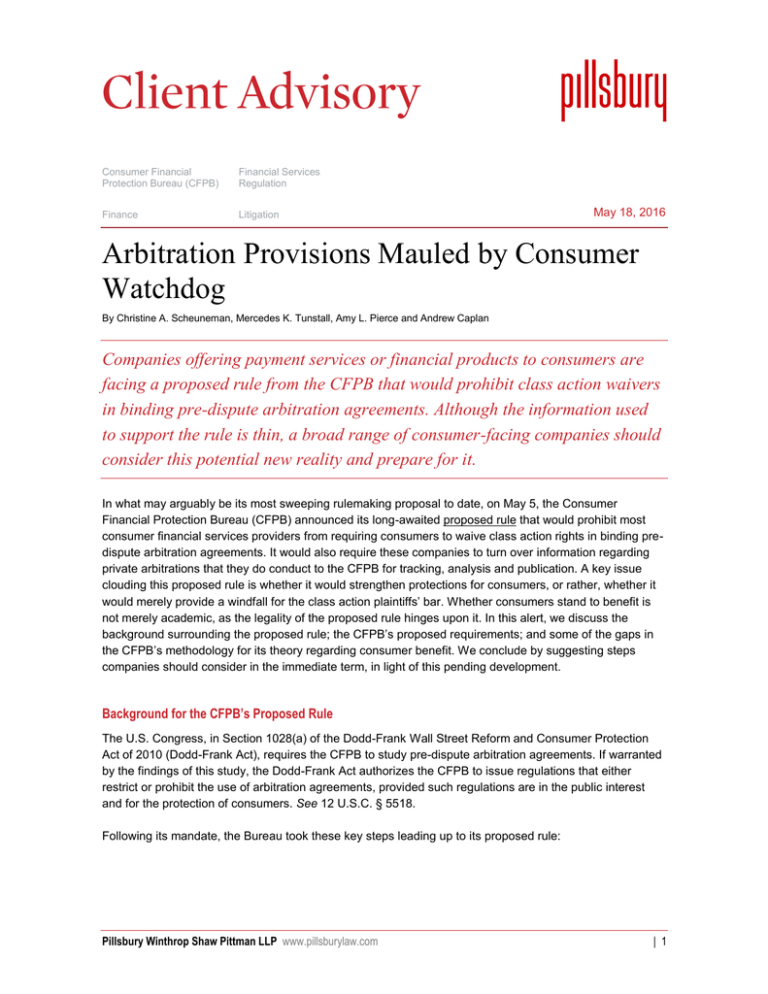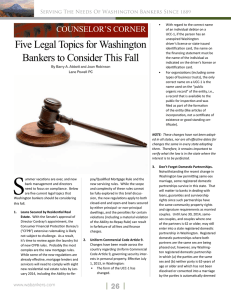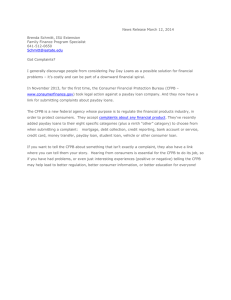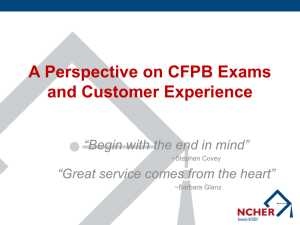
Client Advisory
Finance
Consumer Financial
Protection Bureau (CFPB)
Financial Services
Regulation
Finance
Litigation
May 18, 2016
Arbitration Provisions Mauled by Consumer
Watchdog
By Christine A. Scheuneman, Mercedes K. Tunstall, Amy L. Pierce and Andrew Caplan
Companies offering payment services or financial products to consumers are
facing a proposed rule from the CFPB that would prohibit class action waivers
in binding pre-dispute arbitration agreements. Although the information used
to support the rule is thin, a broad range of consumer-facing companies should
consider this potential new reality and prepare for it.
In what may arguably be its most sweeping rulemaking proposal to date, on May 5, the Consumer
Financial Protection Bureau (CFPB) announced its long-awaited proposed rule that would prohibit most
consumer financial services providers from requiring consumers to waive class action rights in binding predispute arbitration agreements. It would also require these companies to turn over information regarding
private arbitrations that they do conduct to the CFPB for tracking, analysis and publication. A key issue
clouding this proposed rule is whether it would strengthen protections for consumers, or rather, whether it
would merely provide a windfall for the class action plaintiffs’ bar. Whether consumers stand to benefit is
not merely academic, as the legality of the proposed rule hinges upon it. In this alert, we discuss the
background surrounding the proposed rule; the CFPB’s proposed requirements; and some of the gaps in
the CFPB’s methodology for its theory regarding consumer benefit. We conclude by suggesting steps
companies should consider in the immediate term, in light of this pending development.
Background for the CFPB’s Proposed Rule
The U.S. Congress, in Section 1028(a) of the Dodd-Frank Wall Street Reform and Consumer Protection
Act of 2010 (Dodd-Frank Act), requires the CFPB to study pre-dispute arbitration agreements. If warranted
by the findings of this study, the Dodd-Frank Act authorizes the CFPB to issue regulations that either
restrict or prohibit the use of arbitration agreements, provided such regulations are in the public interest
and for the protection of consumers. See 12 U.S.C. § 5518.
Following its mandate, the Bureau took these key steps leading up to its proposed rule:
Pillsbury Winthrop Shaw Pittman LLP www.pillsburylaw.com
| 1
Client Advisory
Finance
On December 12, 2013, the CFPB published a 168-page preliminary report, Arbitration Study Preliminary
Results: Section 1028(a) Study Results To Date, in which it signaled its antipathy toward the use of
arbitration agreements in contracts between financial services providers and consumers.
On March 10, 2015, the Bureau issued a 728-page final report, Arbitration Study: Report to Congress
Pursuant to Dodd-Frank Wall Street Reform and Consumer Protection Act § 1028(a). Here, the CFPB
hardened its position that, compared to class actions, the pre-dispute arbitration system is unfair to
consumers, finding that consumers rarely avail themselves of arbitration, but instead, are foreclosed from
pursuing class action remedies and suffer as a result.
On October 7, 2015, the CFPB announced that it was considering a proposed rule that would prohibit
companies from requiring consumers to waive class action rights in pre-arbitration agreements, and would
require companies that use arbitration clauses to report information to the CFPB about claims filed and
awards issued.
On May 5, 2016, the CFPB released its proposed rule, aligning with the October 7 preview.
Quite ironically, the CFPB’s proposal comes only several years after a seminal U.S. Supreme Court
decision that stood for the exact opposite proposition. In 2011, the Court, in ATT Mobility LLC v.
Concepcion, 131 S. Ct. 1740 (2011) held that a California Supreme Court decision that invalidated class
action waivers in arbitration agreements (referred to as the Discover Bank rule) is preempted by the
Federal Arbitration Act, 9 U.S.C. §§ 1-16, and thus invalid. The Court affirmed the federal policy favoring
arbitration over class-wide relief, citing that “the switch from bilateral to class arbitration sacrifices the
principal advantage of arbitration—its informality—and makes the process slower, more costly, and more
likely to generate morass than final judgment.” Id. at 1751.
While the CFPB’s proposed rule mentions this Supreme Court holding, it avoids the inconvenient topic of
the justification for its proposal’s marked departure from what is settled law and public policy. A review of
both the preliminary and final reports shows that the Bureau was conducting its research and review of
arbitration at and after the time of the Concepcion decision.
The Proposed Rule
At the heart of the proposal, the CFPB would ban consumer financial services providers from requiring
consumers to waive class action rights in connection with pre-dispute arbitration clauses. (In a minor
victory for the industry, the CFPB has not outright banned pre-dispute arbitration agreements—at least not
yet.)
In connection with this substantive requirement, the CFPB has proposed a disclosure that covered
companies must deliver to consumers, whenever such companies use pre-dispute arbitration agreements.
The draft disclosure is very broad and requires companies to pledge that they will not stop consumers from
being part of a class action case in court AND that they will take steps to prevent “anyone else” from using
the arbitration agreement to prevent participation in class actions. The CFPB explains that “[r]equiring a
provider’s arbitration agreement to contain such a provision would ensure that consumers, courts, and
other relevant third parties, including potential purchasers, are made aware when reading the agreement
that it may not be used to prevent consumers from pursuing class actions concerning consumer financial
products or services covered by the proposed rule.” Thus, courts would be precluded from following the
Supreme Court’s guidance in Concepcion and its progeny if anyone attempts to enforce a class action
waiver in a consumer contract governed by the proposed rule.
Pillsbury Winthrop Shaw Pittman LLP www.pillsburylaw.com
| 2
Client Advisory
Finance
The class action waiver ban (and related disclosure requirement) would apply prospectively to agreements
between consumers and companies starting 180 days after the effective date of a final regulation. As such,
covered companies may continue to enforce their current agreements with existing customers, requiring
any disputes to be brought in an arbitral forum on an individual basis. It remains to be seen, however,
whether the CFPB would use its broad authority to prohibit unfair, deceptive, or abusive acts and practices
(UDAAP) to assert claims against these companies on behalf of all consumers that were otherwise
precluded from participating in litigation subject to an arbitration clause with a class action waiver.
In addition to the class action wavier ban, the Bureau’s proposed rule would require companies to report
information about individual arbitrations. Specifically, companies would be required to disclose the
following (otherwise private) data pertaining to arbitrations that they participate in:
The initial claim (whether filed by a consumer or the company) and any counter-claim;
The pre-dispute arbitration agreement filed with the arbitrator or arbitration administrator;
The award, if any, issued by the arbitrator or arbitration administrator;
Any communications from the arbitrator or arbitration administrator relating to a refusal to administer, or
dismissal of a claim, due to the company’s failure to pay required fees; and
Any communications related to a determination that an arbitration agreement does not comply with the
administrator’s fairness principles.
The CFPB plans to publish this otherwise private information on its website “in some form” with
“appropriate redaction or aggregation as warranted.” “Appropriate redaction,” however, would apparently
be limited to redacting information about the consumer—the name of the company and the private
arbitrator would apparently not be redacted. Indeed, the Bureau contemplates that consumers, public
enforcement agencies, and class action plaintiffs’ attorneys would review these records to identify
situations that “warrant further action.” If the ban on consumer class action waivers is cake for the plaintiff’s
bar, consider this to be the serving fork.
The CFPB would not only use this private information to evaluate systemic issues it perceives to be unfair
to consumers underlying the arbitration process (as an aggregated, de-identified data collection effort
would suggest), but would also use the data to determine what types of allegations are being lodged
against specific companies. In essence, these disclosures would provide the CFPB another backdoor
mechanism to conduct de facto investigations regarding companies’ perceived compliance with federal
consumer financial laws—without having to go through an individualized request for information.
The proposed rule would not be limited to one industry, but would affect providers of consumer financial
products and services in the core markets of lending money, storing money, and moving or exchanging
money. Among others, companies offering credit cards, bank accounts, consumer loans, credit reporting
services, money transmission services, or debt collection services, would be affected by the proposed rule.
Under the Dodd-Frank Act, arbitration agreements are already prohibited in mortgage loan documents, so
mortgage industry participants are not covered by the proposal.
Notably, the CFPB hypocritically exempts itself, and all of its governmental brethren, from the ban on class
action waivers in pre-dispute arbitration agreements.
Pillsbury Winthrop Shaw Pittman LLP www.pillsburylaw.com
| 3
Client Advisory
Finance
Reactions and Criticisms
To survive legal scrutiny, the CFPB’s proposed rule must be consistent with the evidence and results of its
own study; must be shown to serve the public interest; and must be required for the protection of
consumers. Significant doubt has already been cast upon whether the CFPB’s proposal would satisfy even
one of these required elements.
As discussed in a prior client alert, the CFPB’s 2013 preliminary report was immediately critiqued by
industry participants as being biased, using an ends justify the means approach. For instance, a key
industry concern was that nearly all of the arbitration clauses that the CFPB studied included class action
waivers, suggesting a self-selection bias in the first instance.
As predicted, the more detailed 2015 report was met with even more nuanced criticism. A recent George
Mason University academic study illuminates several areas where the CFPB’s conclusions depart from
sound empirical support. First and foremost, the recent study concludes that the CFPB does not make a
fair comparison between the benefits of arbitration as opposed to class actions, as the study only
compares arbitration awards to class action settlements. In fact, most arbitrations result in settlements
(similar to litigation), rather than formal awards. By evaluating only formal arbitration awards, the CFPB’s
study makes an apples-to-oranges comparison that omits consideration of the primary outcomes in
arbitration. Imagine if one tried to understand the practical outcomes of consumer litigation by only
studying published court judgments.
The George Mason study also finds that the CFPB’s method for evaluating the consumer benefits of class
actions are biased and flawed. Specifically, in determining the claims rate (i.e., the number of consumers
receiving a payment under a settlement) and the ratio of attorneys’ fees to overall settlement amounts, the
study concludes that the CFPB’s research is unduly skewed by about six unusual settlements with
outsized results that favor consumers. In contrast, the majority of class action cases result in nominal
consumer participation, lower consumer rewards, and a higher ratio of attorneys’ fees to settlement
amount. By using an aggregate average approach, though, these typical results are masked by an
“average” that is weighed heavily by several outlier results.
Even as the CFPB attempts to negatively characterize arbitration, a close look at the CFPB’s data even
supports that arbitration is a generally effective dispute resolution mechanism. For example, the data show
that unrepresented plaintiffs actually fare better in arbitration than in civil litigation, and that arbitration
procedures are inexpensive for consumers (in the range of $200). The CFPB breezes past these data
points, in a thinly veiled effort to build its house of cards upon a theory that multi-million dollar class action
settlements are more beneficial to consumers than arbitration (when in fact, the true winners in class
action settlements are the plaintiffs’ attorneys).
So What Comes Next?
As an offensive measure, companies have 90 days to comment on the CFPB’s proposal once it is
published in the Federal Register (which will be in the coming weeks). In addition to challenging the
proposal’s consumer disclosure and public reporting aspects, companies wishing to challenge the core
ban on class action waivers are encouraged to offer as much empirical evidence as possible to support
that binding arbitration is an effective means of redress for consumers. The Bureau’s proposal must be in
accordance with its study on arbitration. To the extent that private actors can empirically contradict the
CFPB’s evidence and conclusions, this should weaken the CFPB’s legal bases for issuing the proposed
rule—even if such challenges arise post hoc in court.
Pillsbury Winthrop Shaw Pittman LLP www.pillsburylaw.com
| 4
Client Advisory
Finance
Assuming the CFPB moves forward with its proposal (which seems likely under the circumstances), there
no doubt will be legal challenges. As noted above, the countervailing federal public policy supports
arbitration, including class action waivers. The Supreme Court (and other courts) has made this point
clear. What is more, the same type of evidence that may be presented to the CFPB to urge it not to adopt
the proposal (e.g., that the proposal is not supported by the CFPB’s study) may be used in court as a basis
for challenging the legality of the proposal.
In light of the CFPB’s expressed attitude towards arbitration, the reality is that companies face
enforcement risk under the CFPB’s UDAAP authority, regardless of whether the proposed rule is adopted.
Recent UDAAP actions by the CFPB demonstrate that the CFPB will continue to use UDAAP even when a
particular practice is not specifically proscribed by a specific consumer financial services law (such as the
Truth in Lending Act, Real Estate Settlement Procedures Act, etc.). The CFPB certainly will not be
thwarted from using its UDAAP authority where a covered company is able to avoid class actions because
of its use of arbitration provisions with a class action waiver. As we discuss in an earlier client alert, the
CFPB’s criticisms regarding certain aspects of arbitration agreements provide insight into the type UDAAP
enforcement it may take.
The Bureau has drawn its line in the sand, unequivocally voicing its distaste for pre-dispute arbitration
clauses in consumer financial services and products contracts. With or without a formal rule, companies
should take a close look at their consumer dispute mechanisms.
If you have any questions about the content of this advisory, please contact the Pillsbury attorney with
whom you regularly work, or the attorneys below.
Christine A. Scheuneman (bio)
Los Angeles
+1.213.488.7487
christine.scheuneman@pillsburylaw.com
Mercedes K. Tunstall (bio)
Washington, DC
+1.202.663.8118
Mercedes.tunstall@pillsburylaw.com
Amy L. Pierce (bio)
Los Angeles
+1.916.329.4765
amy.pierce@pillsburylaw.com
Andrew Caplan (bio)
Washington, DC
+1.202.663.8110
andrew.caplan@pillsburylaw.com
Kevin M. Fong (bio)
San Francisco
+1.415.983.1270
kevin.fong@pillsburylaw.com
Pillsbury Winthrop Shaw Pittman LLP is a leading international law firm with 18 offices around the world
and a particular focus on the energy & natural resources, financial services, real estate & construction, and
technology sectors. Recognized by Financial Times as one of the most innovative law firms, Pillsbury and
its lawyers are highly regarded for their forward-thinking approach, their enthusiasm for collaborating
across disciplines and their unsurpassed commercial awareness.
This publication is issued periodically to keep Pillsbury Winthrop Shaw Pittman LLP clients and other interested parties
informed of current legal developments that may affect or otherwise be of interest to them. The comments contained herein
do not constitute legal opinion and should not be regarded as a substitute for legal advice.
© 2016 Pillsbury Winthrop Shaw Pittman LLP. All Rights Reserved.
Pillsbury Winthrop Shaw Pittman LLP www.pillsburylaw.com
| 5





